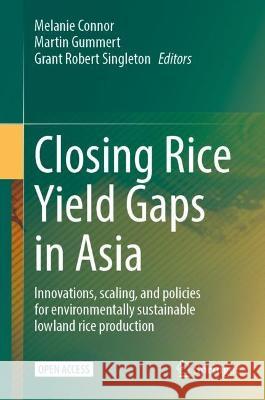Closing Rice Yield Gaps in Asia » książka
topmenu
Closing Rice Yield Gaps in Asia
ISBN-13: 9783031379468 / Angielski / Twarda / 2023
Closing Rice Yield Gaps in Asia
ISBN-13: 9783031379468 / Angielski / Twarda / 2023
cena 191,85 zł
(netto: 182,71 VAT: 5%)
Najniższa cena z 30 dni: 191,40 zł
(netto: 182,71 VAT: 5%)
Najniższa cena z 30 dni: 191,40 zł
Termin realizacji zamówienia:
ok. 20 dni roboczych.
ok. 20 dni roboczych.
Darmowa dostawa!
This open access book contributes not only to the scientific literature on sustainable agricultural development and in particular rice agriculture but also is highly valuable to assist practitioners, projects, and policymakers due to its sections on reducing carbon footprint, agricultural innovations, and lessons learned from a multi-country/multi-stages development project. The scope of the book is conceived as a detailed documentation of the implementation, dissemination, and impact of the CORIGAP project in Sri Lanka, Myanmar, Thailand, China, Vietnam, and Indonesia, with spill-over to Cambodia and the Philippines. It pulls together actionable research findings with the experience of bringing these findings into use. The aim of the book is to provide a wide array of pathways to impact for sustainable rice production in lowland irrigated rice-based agricultural systems. The book is written by local actors of the rice value chain, researchers, and engineers working on a range of best management practices, climate-smart rice production innovations, knowledge translation, and dissemination, as well as decision-making and policy aspects. It is envisioned that the contents of the book can be translated into messages that can help farmers, extension workers, policymakers, and funders of agricultural development, decide on implementing best management practices and climate-smart technologies in their agroecological systems by presenting the technological/practical options along the rice value chain and the partnerships and business models required for their implementation. The book is aimed at practitioners, extension specialists, researchers, and engineers interested in information on current best management practices, sustainable, and climate-smart rice production and constraints that need further investigation. Furthermore, the book is also aimed at policymakers and agricultural development funders required by public opinion and legally binding agreements to reduce greenhouse gas emissions, conserve biodiversity and increase agroecological practices, who are looking for research-based evidence to guide policymaking and implementation.











